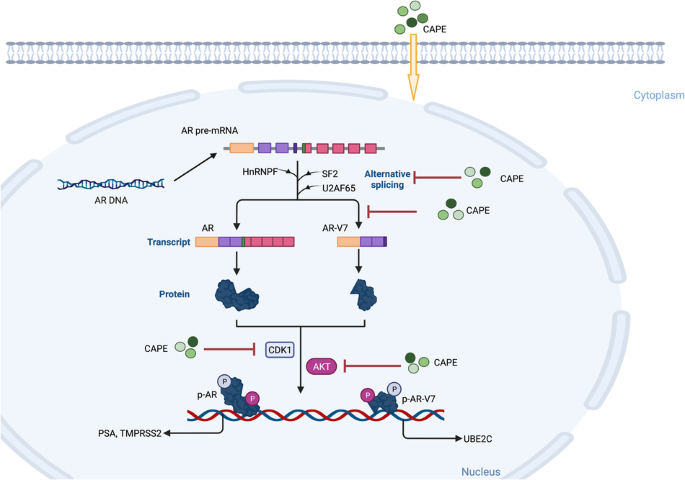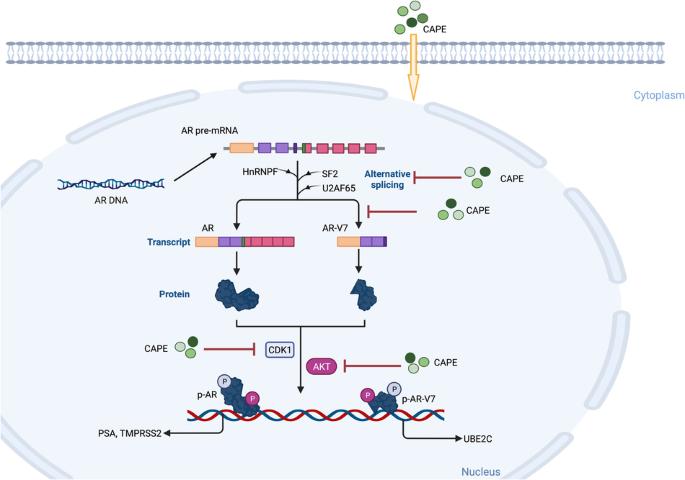咖啡酸苯乙酯通过抑制 CDK1 和 AKT 抑制雄激素受体变体 7 的表达。
IF 4.8
3区 医学
Q1 BIOTECHNOLOGY & APPLIED MICROBIOLOGY
引用次数: 0
摘要
雄激素受体(AR)剪接变体 7(AR-V7)能够在没有配体的情况下进入细胞核并激活下游信号传导。AR-V7 有助于肿瘤生长、癌症转移、癌症干细胞以及耐药性前列腺癌(PCa)的演变。我们发现咖啡酸苯乙酯(CAPE)能抑制 AR-V7 在 PCa 细胞中的表达和下游信号传导。CAPE 阻断了 AR-V7 的基因转录、核定位和蛋白丰度。CAPE抑制了作为AR-V7内含子剪接因子的U2AF65、SF2和hnRNPF的表达。此外,CAPE还降低了AR-V7的蛋白稳定性,并增强了AR-V7的蛋白酶体降解。我们观察到 CDK1 和 AKT 分别通过 Ser81 和 Ser213 的磷酸化调控 AR-V7 的表达和稳定性。CAPE降低了CDK1和AKT的表达。过表达 CDK1 可恢复 CAPE 处理的 PCa 细胞中 AR-V7 的丰度。过表达AR-V7、AKT或CDK1可挽救CAPE处理下PCa细胞的增殖。腹腔注射 10 mg/kg CAPE 可延缓 22Rv1 异种移植裸鼠的生长,并抑制 22Rv1 异种移植中 AR-V7、CDK1 和 AKT 的蛋白水平。我们的研究为应用 CAPE 抑制前列腺肿瘤中的 AR-V7 提供了理论依据。本文章由计算机程序翻译,如有差异,请以英文原文为准。


Caffeic acid phenethyl ester suppresses the expression of androgen receptor variant 7 via inhibition of CDK1 and AKT
Androgen receptor (AR) splice variant 7 (AR-V7) is capable to enter nucleus and activate downstream signaling without ligand. AR-V7 assists the tumor growth, cancer metastasis, cancer stemness, and the evolvement of therapy-resistant prostate cancer (PCa). We discovered that caffeic acid phenethyl ester (CAPE) can repress the expression and downstream signaling of AR-V7 in PCa cells. CAPE blocked the gene transcription, nuclear localization, and protein abundance of AR-V7. CAPE inhibited the expression of U2AF65, SF2 and hnRNPF, which were splicing factors for AR-V7 intron. Additionally, CAPE decreased protein stability of AR-V7 and enhanced the proteosome-degradation of AR-V7. We observed that CDK1 and AKT regulated the expression and stability of AR-V7 via phosphorylation of Ser81 and Ser213, respectively. CAPE decreased the expression of CDK1 and AKT. Overexpression of CDK1 restored the abundance of AR-V7 in CAPE-treated PCa cells. Overexpression of AR-V7, AKT or CDK1 rescued the proliferation of PCa cells under CAPE treatment. Intraperitoneal injection of 10 mg/kg CAPE retarded the growth of 22Rv1 xenografts in nude mice and suppressed the protein levels of AR-V7, CDK1 and AKT in 22Rv1 xenografts. Our study provided the rationale of applying CAPE for inhibition of AR-V7 in prostate tumors.
求助全文
通过发布文献求助,成功后即可免费获取论文全文。
去求助
来源期刊

Cancer gene therapy
医学-生物工程与应用微生物
CiteScore
10.20
自引率
0.00%
发文量
150
审稿时长
4-8 weeks
期刊介绍:
Cancer Gene Therapy is the essential gene and cellular therapy resource for cancer researchers and clinicians, keeping readers up to date with the latest developments in gene and cellular therapies for cancer. The journal publishes original laboratory and clinical research papers, case reports and review articles. Publication topics include RNAi approaches, drug resistance, hematopoietic progenitor cell gene transfer, cancer stem cells, cellular therapies, homologous recombination, ribozyme technology, antisense technology, tumor immunotherapy and tumor suppressors, translational research, cancer therapy, gene delivery systems (viral and non-viral), anti-gene therapy (antisense, siRNA & ribozymes), apoptosis; mechanisms and therapies, vaccine development, immunology and immunotherapy, DNA synthesis and repair.
Cancer Gene Therapy publishes the results of laboratory investigations, preclinical studies, and clinical trials in the field of gene transfer/gene therapy and cellular therapies as applied to cancer research. Types of articles published include original research articles; case reports; brief communications; review articles in the main fields of drug resistance/sensitivity, gene therapy, cellular therapy, tumor suppressor and anti-oncogene therapy, cytokine/tumor immunotherapy, etc.; industry perspectives; and letters to the editor.
 求助内容:
求助内容: 应助结果提醒方式:
应助结果提醒方式:


